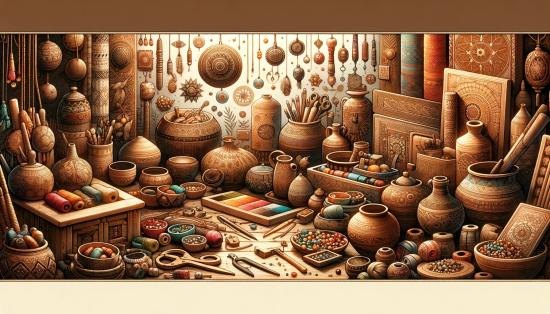
Discovering the Charm of Handmade Artisan Products: A Closer Look
Discover the unique world of handmade artisan products, where creativity and tradition come together to create charm and authenticity.
The world of handmade artisan products is a unique and diverse one, filled with creativity, passion, and a rich history of traditional craftsmanship. Artisans take pride in creating each item by hand, infusing them with a personal touch and individuality that mass-produced items simply cannot match. Exploring this world offers a deeper appreciation for the time and effort that goes into creating each piece, as well as an understanding of the materials and techniques used in the process. Supporting local artisans and their craft is essential for preserving tradition and promoting sustainable practices. Choosing handmade over factory-made products also has environmental benefits, as it reduces the carbon footprint and supports ethical production methods. Whether it's finding authentic handmade goods online or connecting with local artisan communities, there are endless ways to discover and cherish the charm of handmade artisan products.
When it comes to the items we use and enjoy in our daily lives, exploring the difference between handmade and mass-produced products can offer valuable insights. Handmade items are unique and carry a personal touch that simply cannot be replicated in mass-produced goods. Artisans pour their time, skill, and passion into creating each piece, resulting in individuality and sense of connection with the item. On the other hand, mass-produced items are often made in large quantities, using machinery and standardized processes, which can lead to uniformity and lack of distinctiveness. Understanding and appreciating the difference between these two approaches to production can lead to a greater appreciation for the dedication and artistry that goes into handmade items.
Supporting local artisans and their craft is incredibly important for many reasons. When you purchase handmade products, you are not only investing in a unique and high-quality item, but you are also supporting the livelihood of local artisans and their communities. By choosing to buy from local artisans, you are contributing to the preservation of traditional crafts and techniques that have been passed down for generations. Additionally, purchasing from local artisans helps to sustain a sense of community and fosters a connection between the maker and the consumer. This personal connection and knowledge of the item's origin add a special value to handmade products that cannot be replicated by mass-produced items. Lastly, supporting local artisans promotes sustainability and ethical consumption by reducing the carbon footprint associated with mass production and often utilizing eco-friendly materials.
Handmade products offer a level of individuality and personal touch that mass-produced items simply cannot replicate. Each artisan puts their own unique spin on their creations, whether it's a hand-painted design, a custom-made piece of jewelry, or a hand-sewn garment. The attention to detail and care put into each item is evident, making it feel special and one-of-a-kind. When you purchase a handmade product, you're not just buying an item; you're investing in the story and passion of the person who created it. This personal connection is what sets artisan products apart and adds a sense of charm and authenticity to each piece.
Creating each handmade item involves a meticulous and labor-intensive process that is filled with care and attention to detail. Artisans often start by sourcing high-quality materials, often natural and sustainable, to ensure the best possible outcome for their creations. From there, they spend countless hours designing, crafting, and refining each item to perfection. Whether it's pottery, jewelry, textiles, or any other artisanal product, the creator puts a piece of themselves into every step of the process. This personal touch and dedication to quality result in products that are truly unique and reflective of the artisan's skill and passion. The care that goes into each handmade item is what sets them apart and makes them highly sought after by those who appreciate authenticity and craftsmanship.
Understanding the materials often used in artisan products is essential for appreciating the skill and craftsmanship that goes into creating each unique item. Artisans often work with a wide range of materials, including wood, metal, ceramics, glass, fabric, and more. Each material brings its own set of challenges and opportunities, requiring specialized knowledge and techniques to manipulate and transform it into a beautiful and functional piece of art. For example, woodworking may involve selecting the right type of wood, understanding its grain and texture, and using specific tools to shape and carve it. Metalworking, on the other hand, requires knowledge of different metals, their properties, and the techniques for cutting, welding, and shaping them. By understanding these materials and the artisan's expertise in working with them, consumers can gain a deeper appreciation for the handmade products they purchase.
When it comes to making environmentally conscious choices, opting for handmade products over factory-made ones can have a significant impact. Handmade items are often crafted using sustainable materials and methods, reducing the ecological footprint of production. Additionally, artisans prioritize quality over quantity, leading to longer-lasting products that don't contribute to the cycle of fast fashion and disposable consumer goods. By supporting local artisans, you're also reducing the carbon footprint associated with the transportation of mass-produced goods, as well as helping to sustain traditional craftsmanship and local economies. Furthermore, choosing handmade over factory-made encourages a shift towards a more mindful and sustainable consumer culture, valuing the care and attention put into each individual item rather than the mass production of disposable goods. Overall, embracing handmade products can be a positive step towards environmental sustainability and ethical consumption.
When looking to find and purchase authentic handmade goods, there are various options available both online and locally. Online platforms such as Etsy, Amazon Handmade, and artisanal websites offer a wide range of handmade products from around the world. These platforms often provide detailed information about the artisans and their craft, allowing customers to connect with the makers and understand the stories behind the products. Local markets, craft fairs, and artisan cooperatives are also great places to discover unique handmade items within your community. These events offer the opportunity to meet the artisans in person, ask questions, and gain a deeper appreciation for their creations. Visiting local boutiques and galleries that specialize in handmade goods is another way to find authentic artisan products. Building relationships with the owners and staff can lead to insights into the provenance and quality of the handmade items they carry.
Caring for and maintaining artisan products is essential to ensure their longevity and quality. One tip is to follow any specific care instructions provided by the artisan or manufacturer, as they know best how to preserve the item. For textiles, hand wash or gentle machine wash in cold water can help maintain the fabric's integrity. Avoiding harsh chemicals or bleach is crucial to prevent damage to delicate materials. For wooden or metal artisan pieces, regular dusting and occasional polishing with appropriate products can keep them looking beautiful. Additionally, storing these items in a cool, dry place away from direct sunlight or moisture can prevent degradation. Taking the time to clean and protect artisan products will enhance their beauty and value for years to come.
Connecting with local artisan communities and events is an enriching experience that allows you to immerse yourself in the creativity and passion of skilled craftsmen and women. One way to connect with local artisans is by attending craft fairs, markets, and festivals in your area. These events provide an ideal opportunity to meet and interact with artisans, learn about their craft, and purchase their handmade products directly. Additionally, consider joining artisan workshops or classes where you can learn new skills and techniques while forming connections with local artisans. Engaging with local artisan communities on social media platforms and following their pages can also help you stay informed about upcoming events, workshops, and markets. By actively participating in and supporting local artisan communities and events, you are contributing to the preservation of traditional crafts and fostering a vibrant and sustainable creative ecosystem.
Related posts

